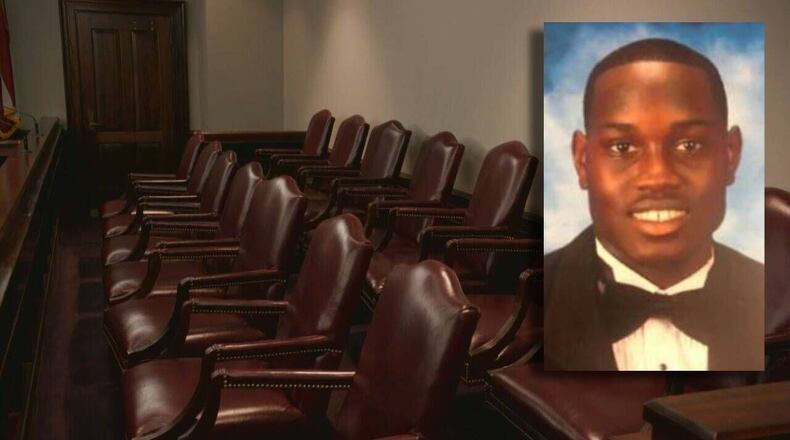BRUNSWICK — For the fourth consecutive day, several prospective jurors questioned about the Ahmaud Arbery case made it clear they think race played a crucial role in the fatal shooting.
Another eight people were qualified as possible jurors on Thursday, when court remained in session until after 8 p.m. State prosecutors and defense attorneys representing the three men standing trial in the 25-year-old’s death must qualify a pool of 64 candidates from whom 12 jurors and four alternates will be chosen.
Twenty-three people have been qualified through the first four days of jury selection in the high-profile trial, and finding those who believe they can remain impartial has proved challenging for attorneys on both sides.
As they had in previous days, some prospective jurors said they have strong feelings about the case, which has dominated national headlines and local news coverage since early last year. Many said the widely shared cellphone video of the unarmed Arbery being chased and fatally shot in the Satilla Shores subdivision is what formed their opinion.
Arbery was Black. The three men charged in his killing are white.
The jurors ultimately selected will be tasked with deciding whether Travis McMichael, his father Greg McMichael, and their neighbor William “Roddie” Bryan are guilty of murder and other charges in the February 2020 homicide. The defendants strongly contest the charges, contending they were trying to make a citizen’s arrest because they believed Arbery was responsible for a string of neighborhood break-ins.
Several prospective jurors questioned Thursday, however, said they didn’t think Arbery would have been killed if he were white.
Juror No. 221 said she would try hard to remain impartial, though it would test her beliefs supporting the social justice movement. She was at least the second potential juror in three days to refer to the shooting as a “hate crime,” and said she believes the “system is broken.”
The woman said she took part in rallies supporting the Black Lives Matter movement, and even one vigil in Arbery’s memory.
“A young man was inappropriately shot walking around a neighborhood,” she wrote on her juror questionnaire. “Looked like a citizen’s arrest that went horribly wrong.”
She also wrote that she didn’t believe Arbery was a threat to the defendants when he was killed.
Laura Hogue, one of Greg McMichael’s attorneys, pressed juror No. 221, asking if she thought she would have been killed had she been in the same place that afternoon.
“I’m a white old lady,” the woman replied. “It’s my race, my age, gender. … That’s why I think they wouldn’t come after me if I was walking the neighborhood.”
Another juror, No. 218, wrote on her questionnaire that she believed Arbery was killed because of the color of his skin and that the men responsible nearly got away with it.
As daylong demonstrations raged outside, attorneys representing the McMichaels and Bryan raised concerns that the protesters gathered in front of the courthouse could influence jurors’ answers and deny the defendants their right to a fair trial.
Credit: ASIA SIMONE BURNS / ASIA.BURNS@AJC.COM
Credit: ASIA SIMONE BURNS / ASIA.BURNS@AJC.COM
Juror No. 218 was told to leave the courtroom during questioning after Arbery’s father and two others walked into the gallery wearing social justice buttons on their lapels. One featured the likeness of the late civil rights icon and longtime Georgia Democratic U.S. Rep. John Lewis along with his motto: “Make Good Trouble.” It also contained logos for the Rainbow PUSH Coalition and other social justice groups.
Superior Court Judge Timothy Walmsley asked the three to remove their buttons after Bryan’s attorney, Kevin Gough, raised objections. The judge said he admired Lewis, but that the courtroom was not the place for such displays.
“I respect the fact this case has garnered a great deal of interest and a number of movements have been attached to it. I don’t have a problem with that,” Walmsley said.
He said Arbery’s slaying and similar cases “have really opened up a very important discussion. But it’s not a discussion that’s appropriate for this courtroom right now.”
Gough also raised concerns about the large group of demonstrators gathered on the courthouse grounds each day through the first week of trial.
Other potential jurors told attorneys they didn’t think they could be impartial because they knew one or more of the defendants. This included one woman, juror No. 236, who said she had known Greg McMichael for three decades.
She said she is worried there would be “an appearance of impropriety” if she served on the jury.
“I don’t want to be a distraction and be a problem for a case that’s already caused problems in our community,” she said.
Another man, juror No. 242, said he knows the McMichaels and Bryan well, and that he had been in a local hunting club with the father and son for more than 20 years.
“I just feel like I know them too good,” he told attorneys during individual questioning. “I look at Travis and Greg and I’ve known them a long time.”
Jury selection resumes Monday morning.
About the Author
Keep Reading
The Latest
Featured




